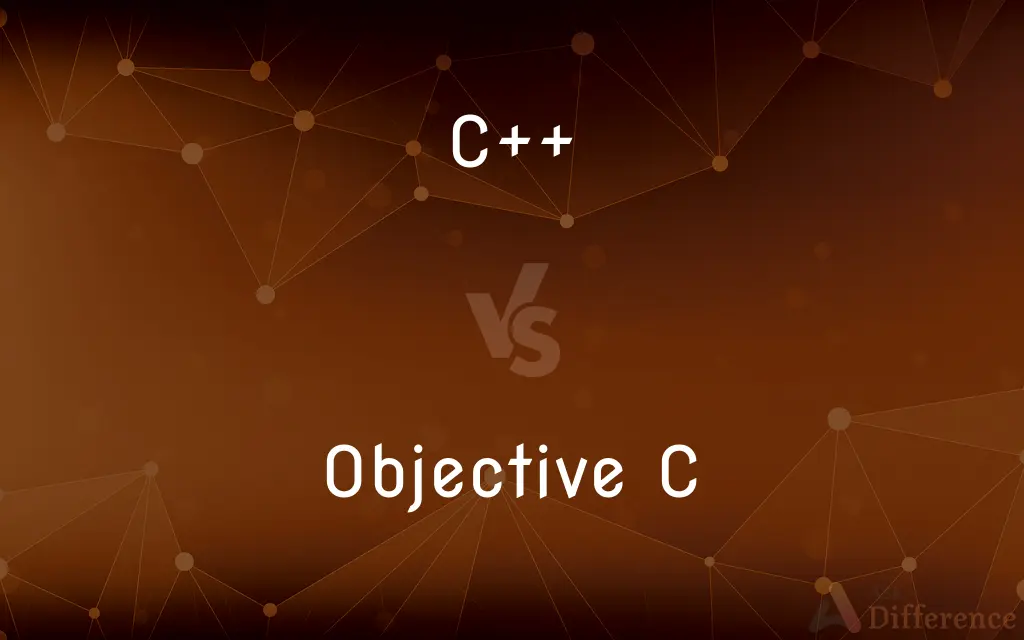C++ vs. Objective C — What's the Difference?
By Tayyaba Rehman — Published on January 1, 2024
C++ is a statically typed, multi-paradigm programming language known for its performance, while Objective-C is a dynamic, object-oriented language that was once the primary language for iOS development.

Difference Between C++ and Objective C
Table of Contents
ADVERTISEMENT
Key Differences
C++ is a general-purpose programming language created as an extension of the C programming language. It is known for its efficiency and control over system resources and memory. C++ supports multiple programming paradigms, including procedural, object-oriented, and generic programming, making it versatile for various applications, from software to game development.
Objective-C, on the other hand, is an object-oriented language that adds Smalltalk-style messaging to C. It was used primarily for macOS and iOS development before the introduction of Swift. Objective-C's dynamic nature allows for features like runtime type checking and dynamic method resolution, which can offer more flexibility but often at the cost of performance.
C++ leverages a powerful standard template library (STL) that includes a rich set of methods for manipulating data structures, which enhances the language's capabilities for complex algorithms and data management. Objective-C utilizes frameworks like Cocoa and Cocoa Touch, which provide a wide range of pre-built classes for developing graphical user interfaces.
The compilation model of C++ typically results in faster executable code due to extensive compile-time optimizations. Objective-C, while also compiled, tends to be slower due to its dynamic dispatch and the overhead of its runtime.
Both languages have deep roots in C, providing a base of compatibility with C libraries. However, C++ has a more global presence across various domains, while Objective-C has been primarily focused on applications for Apple's ecosystem.
ADVERTISEMENT
Comparison Chart
Paradigm
Multi-paradigm: procedural, object-oriented, generic.
Object-oriented with dynamic features.
Performance
Generally faster due to static typing and optimizations.
Slower because of dynamic typing and runtime overhead.
Standard Library/Framework
Standard Template Library (STL).
Cocoa and Cocoa Touch frameworks.
Typing
Statically typed.
Dynamically typed.
Usage Domain
Broad (systems, applications, games, embedded).
Focused (primarily Apple ecosystem).
Compare with Definitions
C++
Supports object-oriented programming with classes and inheritance.
C++ classes provide encapsulation and abstraction mechanisms.
Objective C
Used extensively in Apple's ecosystem.
Objective-C leverages Cocoa for developing macOS applications.
C++
Allows operator overloading and function overloading.
Overloading operators in C++ can make the code more intuitive.
Objective C
Supports categories for extending classes.
Categories in Objective-C allow adding methods to existing classes.
C++
A statically typed programming language with low-level memory manipulation.
C++ is often chosen for systems programming due to its efficiency.
Objective C
A dynamic, object-oriented language based on C.
Objective-C was the main language for iOS development before Swift.
C++
Incorporates both manual and automatic memory management.
C++ developers often use smart pointers for automatic memory management.
Objective C
Offers dynamic runtime similar to that of Smalltalk.
The dynamic nature of Objective-C simplifies certain kinds of extensible designs.
C++
Provides templates for generic programming.
C++ templates enable writing type-independent code.
Objective C
Incorporates Smalltalk-style messaging.
Objective-C uses messaging for invoking methods on objects.
Common Curiosities
Can Objective-C be used for cross-platform development?
While possible, Objective-C is predominantly used for Apple's platforms.
What is C++ used for?
C++ is used for software development, including systems software, game development, and performance-critical applications.
What is Objective-C used for?
Objective-C has been primarily used for developing applications for macOS and iOS.
Is Objective-C still relevant after the introduction of Swift?
While its use has declined, Objective-C is still relevant for maintaining existing applications.
Does C++ support dynamic typing like Objective-C?
No, C++ is statically typed, though it can interface with dynamic types via libraries.
What IDEs can I use for C++ development?
There are many, including Visual Studio, Eclipse, and Code::Blocks.
Are both C++ and Objective-C compatible with C?
Yes, they can both interoperate with C code.
Is C++ faster than Objective-C?
Generally, C++ is faster due to static typing and more aggressive compile-time optimizations.
Does C++ have garbage collection?
No, C++ typically uses manual memory management or smart pointers.
Can C++ code be easily ported to Objective-C?
They can interoperate, but direct porting might require significant changes due to paradigm differences.
Does Objective-C have garbage collection?
Objective-C used to have garbage collection, but now it uses Automatic Reference Counting (ARC) for memory management.
Can C++ use Objective-C libraries?
With some effort, C++ can use Objective-C libraries, especially on Apple platforms.
Is multiple inheritance allowed in C++?
Yes, C++ supports multiple inheritance, though it's often avoided due to complexity.
Are there any IDEs specific to Objective-C?
Xcode is the primary IDE for Objective-C development.
Is multiple inheritance allowed in Objective-C?
No, Objective-C does not support multiple inheritance; it uses protocols instead.
Share Your Discovery

Previous Comparison
Keynote vs. PowerPoint
Next Comparison
Apical Bud vs. Axillary BudAuthor Spotlight
Written by
Tayyaba RehmanTayyaba Rehman is a distinguished writer, currently serving as a primary contributor to askdifference.com. As a researcher in semantics and etymology, Tayyaba's passion for the complexity of languages and their distinctions has found a perfect home on the platform. Tayyaba delves into the intricacies of language, distinguishing between commonly confused words and phrases, thereby providing clarity for readers worldwide.
















































